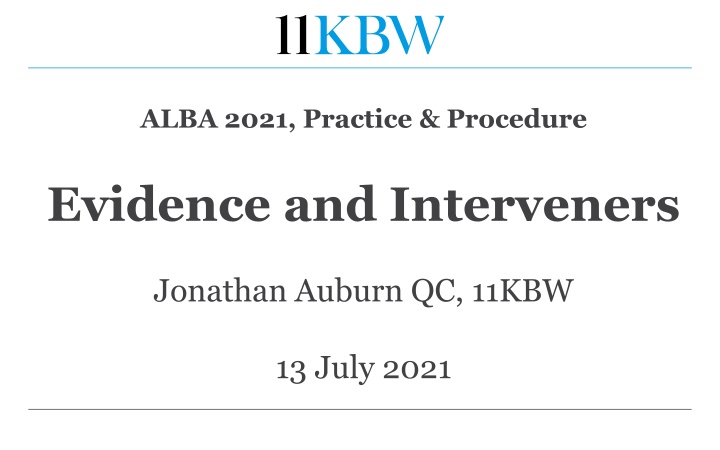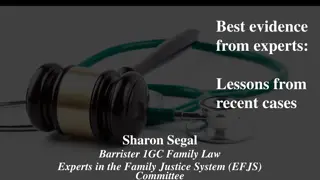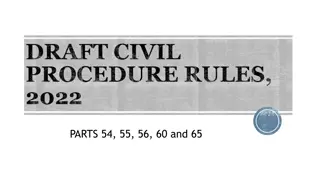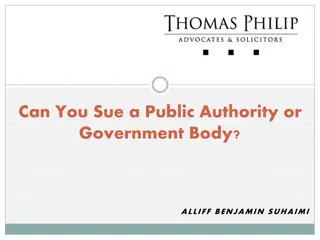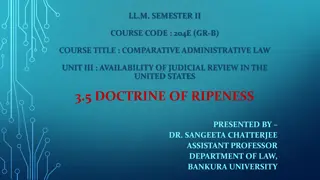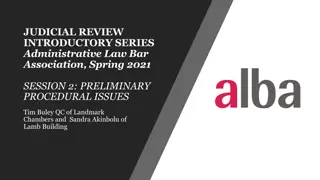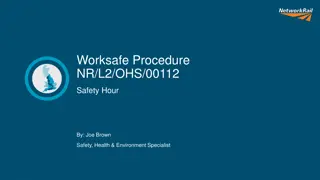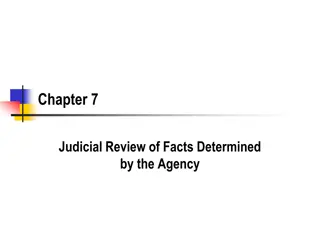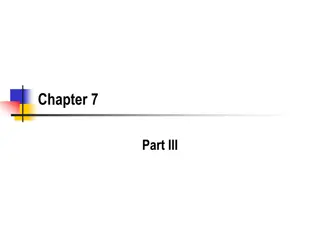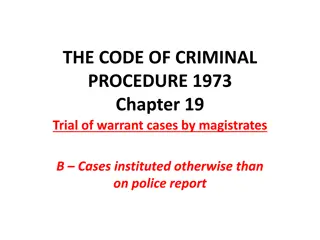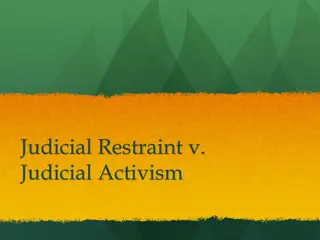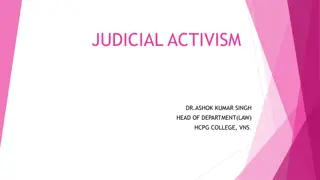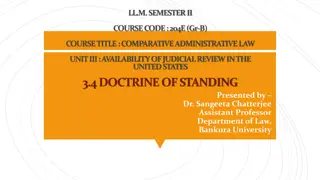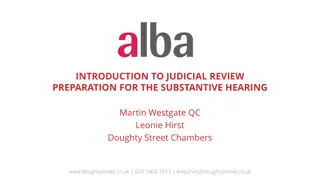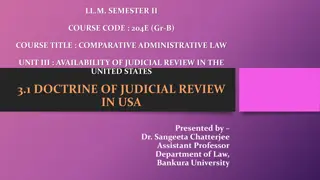Practice and Procedure in Judicial Review: Factual Evidence and Interveners
The content provides valuable insights into the practice and procedure regarding factual evidence and interveners in judicial review cases. It covers general rules, recent cases, applications for oral evidence, questioning witnesses, opinion evidence, and the role of interveners. Key points include serving factual evidence with the claim form, verifying facts, replying to evidence, pagination requirements, and the approach to resolving disputes of fact. The discussion emphasizes the importance of evidence in judicial review proceedings and the methods used to determine factual disputes.
Download Presentation

Please find below an Image/Link to download the presentation.
The content on the website is provided AS IS for your information and personal use only. It may not be sold, licensed, or shared on other websites without obtaining consent from the author.If you encounter any issues during the download, it is possible that the publisher has removed the file from their server.
You are allowed to download the files provided on this website for personal or commercial use, subject to the condition that they are used lawfully. All files are the property of their respective owners.
The content on the website is provided AS IS for your information and personal use only. It may not be sold, licensed, or shared on other websites without obtaining consent from the author.
E N D
Presentation Transcript
ALBA 2021, Practice & Procedure Evidence and Interveners Jonathan Auburn QC, 11KBW 13 July 2021
CONTENTS General rules Factual ev in JR - approach Factual ev in JR - recent cases Applics for oral ev, questioning wits Opinion evidence Interveners
General Rules Factual ev in JR - approach Factual ev in JR - recent cases Applics for oral ev, questioning wits Opinion evidence Interveners
must serve factual ev with claim form: CPR PD 54A 4.4(1)(a); CPR 8.5(1) And any docs on which C proposes to rely : CPR PD 54A 4.4(1)(f) facts in claim form verified by S/ment of Truth may be relied on as ev: CPR 8.5(7) reply ev w/in 14 days of D s ev: CPR 8.5(5) other times req.s permission CPR 54.16(2) Clmnt SGs stage: CPR 54.8 silent on ev - DGs stage: any written ev required CPR54.14(1)(b) must be paginated, indexed bundle - CPR PD 54A 9.1(3) CPR PD 54A 10.1: DGs should ID relevant facts, underlying reasoning CPR PD 54A 10.2: disclosure not req d unless the court orders otherwise Dfdt
General Rules Factual ev in JR - approach Factual ev in JR - recent cases Applics for oral ev, questioning wits Opinion evidence Interveners
traditionally JR courts rarely sought to resolve disputes of fact; said JR is about issues of law rather than fact det n of factual disputes increased: Al-Sweady [2009] EWHC 2387 (Admin), 18-19; Bancoult [2012] EWHC 2115 (Admin), 17-18 broadly 2 methods: [1] consider wit s/ments & doc y ev w/o x-x [2] hear oral ev & x-x if only doc y ev, approach of preferring D s ev: ex p St Germain (No 2) [1979] 1 WLR 1401, 1410; ex p Cran (1995) 94 LGR 8, 12
if Ds wit.s not Qd, little basis for rejecting ther ev: Airedale NHS Trust [2002] EWHC 1780 (Admin), 18 unless something about D s ev leads ct to not accept it: Airedale NHS Trust, 18; McVey v SS Health [2010] EWHC 437 (Admin), 28 e.g. internal contradiction, inherent implausibility, inconsis with incontrovertible ev
General Rules Factual ev in JR - approach Factual ev in JR - recent cases Applics for oral ev, questioning wits Opinion evidence Interveners
R (Safeer) v SSHD [2018] EWCA Civ 2518 Nicola Davies LJ at 19: re McVey exception where D s account not accepted if docs show that D's ev cannot be correct, threshold is high CA approved McVey approach 20: the test, namely that the appellant's document shows that the respondent's ev cannot be correct, is a high one. In determining this applic it is not for the court to speculate, its role is to scrutinise the relevant ev The appellant's ev is not of so compelling a nature as to demonstrate that this account cannot be correct. At this substantive hearing, in the absence of such cogent ev on behalf of the appellant the basic rule is to be followed, namely that the facts in the respondent's ev must be assumed to be correct. Accordingly, I accept the ev of the respondent
both Safeer & McVey involved dispute on simple binary Q within D s knowledge Soltany v SSHD [2020] EWHC 2291: conditions at Brook House IRC where case involves various disputed factual claims
Soltany v SSHD [2020] EWHC 2291 Cavanagh J at 88: where there are numerous various factual issues, generally proceed on the basis of D s evidence This is because, as C bears the burden of proof, if there is no reason to doubt D s version of the facts, C will have failed to discharge the burden on him or her. As D s witnesses will not have been cross-examined, there will be little basis for the court to reject their evidence. However, in certain cases there may be something about D s evidence (e.g. where it is internally contradictory, inherently implausible, or inconsistent with other incontrovertible evidence) which will lead the court not to accept it.
R (NB) v SSHD [2021] EWHC 1489 (Admin) Linden J gives detailed explanation of his approach to fact- finding conditions for asylum-seekers in Napier Barracks 36-37 adopted Cavanagh J s approach from Soltany 33: disputed facts adopted McVey approach 37: This is the approach which I have adopted. With respect, essentially it requires a common-sense approach to the evaluation of the ev as a whole, applying the burden of proof and taking into a/c the fact that there has been no live evidence or cross examination. In my view, as part of this exercise it is permissible to take into account the quality of the ev on a given point, and whether that ev is w/in the knowledge of the deponent and, if not, the source of their info. In the case of exhibits, it is permissible to consider such ev as the deponent provides to explain its contents and as to the source and reliability of the info which it contains.
General Rules Factual ev in JR - approach Factual ev in JR - recent cases Applics for oral ev, questioning wits Opinion evidence Interveners
CPR 8.6(3): The court may give directions requiring the attendance for x-x of a wit who has given written ev court s power to order x-x: CPR 8.6(2), (3), CPR 32.1; R (G) LB Ealing [2002] EWHC 250 (Admin), 5-28 test: whether necessary to hear oral ev in order to determine the claim fairly & justly cases on precedent fact; Conv Rights cases; clear conflict of ev on a factual issue imp to the claim, eg. procedure D followed, allegation of bias
CPR PD 54A 10 It will rarely be necessary in JR proceedings for the court to hear oral ev. Any application under rule 8.6(2) for permission to adduce oral ev or to cross-examine any witness must be made promptly, in accordance with the requirements of Part 23, and be supported by an explanation of why the evidence is necessary for the fair determination of the claim
R (Conway) v Secretary of State for Justice [2018] EWCA Civ1431 challenge to blanket ban on assisted suicide in Suicide Act 1961 s.2(1) 189: the ev in this case is considerable. Imp parts of it are conflicting. There was no request for oral ev or x-x. That seems to us to be right. The conflict inherent in the moral and ethical issues involved in balancing the principles of sanctity of life and the right of personal autonomy cannot be resolved in a forensic setting by x-x. Conflicts in the expert opinion and factual evidence as to the appropriateness of the criteria in Mr Conway's scheme and the existence and extent of risk of an incorrect decision that the substantive criteria are satisfied are unlikely to be resolved satisfactorily by x-x
R (T) v Ministry of Justice [2018] EWHC 2615 (Admin) HRA challenge to the legality of the Suicide Act 1961, s.2(1) prohibition on assisted suicide C sought to x-x one of D s witnesses DC ordered trial of prelim issue of whether "it was approp and necessary to hear first-hand ev with x-x to seek to determine the mixed ethical, moral and social policy issues that [underlay] whether Parliament's prohibition on assisted suicide in s.2(1) was a justified interference with the claimant's rights rejected - no need for oral ev or x-x factual foundations for the views of the various experts were either already clear, or could be clarified in submissions from counsel based on the written material
General Rules Factual ev in JR - approach Factual ev in JR - recent cases Applics for oral ev, questioning wits Opinion evidence Interveners
when applies - evidence is either of fact or opinion - if opinion, then can only be given by an expert CPR 35 - 35.1: Expert ev shall be restricted to that which is reasonably required to resolve the proceedings - 35.4(1): No party may call an expert or put in evidence an expert s report without the court s permission - 35.4(2): information to be provided in applications - 35.7: single joint expert - 35.10: contents of an expert report
R (The Law Society) v Lord Chancellor [2018] EWHC 2094 (Admin) guidance to Cs seeking to rely on expert ev applic should be made as soon as it becomes apparent that expert ev is required applic should usually be made as part of claim so that it can be considered at permission stage if made after permission stage, applic should be put before a judge asap expert evidence is seldom reasonably required to resolve a JR claim
HK v SSHD [2016] EWHC 857 (Admin) CPR Part 35 applies to expert ev in JR and a failure to comply with it will require an application for relief from sanctions R (RF) v SSWP [2017] EWHC 3375 (Admin), [2018] PTSR 1147 unless there is a recognised body of expertise governed by recognised standards and rules of conduct relevant to the question which the court has to decide, the court should decline to admit evidence which ex hypothesi is not evidence of any body of expertise but rather the subjective opinion of the intended witness New Media Distribution Company Sezc Ltd v Kagalovsky [2018] EWHC 2742 (Ch) - not a JR case; expert evidence should not be introduced via witness statements of witnesses of fact; it can only be adduced under the provisions of CPR Part 35
R (Banks Renewables Ltd) v SSBEIS [2020] EWHC 197 (Admin) stressing imp of compliance with CPR Part 35 where a party seeks to rely upon expert evidence in a JR claim desirable to determine the admissibility of expert ev in advance of the rolled-up hearing R (Transport Action Network) v Sec of State Transport [2021] EWHC 568 (Admin) relevant considerations challenge; Lang J permitted C to adduce two statements on the basis that they did not constitute expert reports statement makers did not have first-hand knowledge of the decision, but they were experts in the field with views on the issues dispute was re whether certain ev had been de minimis and therefore not material considerations ev from C s experts was on how & why SoS had allegedly underestimated emissions; fell within ambit of expert ev; was a technical complex field; judge would need assistance
Expert ev in procurement JRs By Development Ltd v Covent Garden Market Authority [2012] EWHC 2546 (TCC) - expert ev not generally admitted for issues of manifest error / irrationality unless specific reasons Bop-Me Ltd v SS Health [2021] EWHC 1817 (TCC) - expert ev admitted on issue of whether testing reports were industry compliant
General Rules Factual ev in JR - approach Factual ev in JR - recent cases Applics for oral ev, questioning wits Opinion evidence Interveners
Interveners - basics CPR 54.17(1): any person may apply for permission to file ev or make representations at hearing applic should be made promptly: CPR 54.17(2); CPR PD 54A 12.2 applies to those who do not qualify as an I.P.; ie. not directly affected by claim - CPR 54.1(2)(f)
Interveners applications now CPR PD 54A 12.1: applics must comply with CPR 23 previously: by letter, with no fee CPR PD 54A 12.4: applic notice explain who Int r is & nature of participation may be dealt with w/o a hearing: CPR PD 54A 12.7 inc a summary of any proposed representations inc a copy of evidence with the Application Notice
Interveners factors & candour factors in court s decision - promptness / delay: CPR PD 54A 12.2 The Court is unlikely to accede to an application to intervene if it would have the consequence of delaying the hearing of the relevant proceedings. - Re Northern Ireland Human Rights Cmmssn [2002] UKHL 25, 25, 32: whether intervention will assist court to perform its role; balance benefits from intervention ag inconvenience, delay & expense to parties - Re E [2008] UKHL 66, 3: whether intervener adds something new candour - duty of candour applies to interveners: CPR PD 54A 12.4 - relevance to promptness req t; when was proposed Int r first aware?
